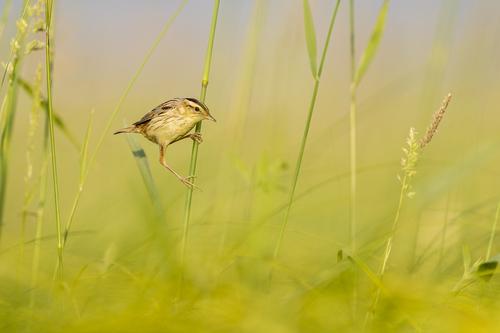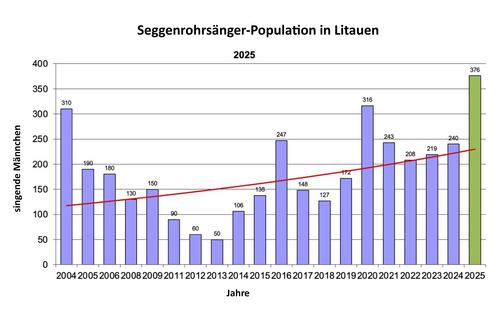A ray of hope for Europe's rarest songbird: this year, a record number of Aquatic Warblers were recorded in Lithuania. During last summer's census, bird conservationists counted 376 singing males. However, there is still cause for concern.

A rare sight: a male Aquatic Warbler in its preferred habitat. EuroNatur and its partners are committed to ensuring that this endangered bird species does not become extinct.
© Žymantas Morkvėnas, Baltic Environmental Forum Lithuania
The trend is upward: the graph shows the encouraging development of Aquatic Warbler populations in Lithuania.
© Baltic Environmental Forum LithuaniaLithuania recorded the most successful breeding season in more than twenty years for the Aquatic Warbler, which is threatened with extinction. 376 singing males – this is how this rather inconspicuous and promiscuous bird species is usually recorded – were counted in the sedge marshes of this Baltic country. Compared to the average for the 2010s, this represents a threefold increase in population.
EuroNatur has been involved in the international LIFE project for the protection of the Aquatic Warbler for around a year. “We are delighted with the good news from Lithuania this summer,” says Dr Justine Vansynghel, migratory bird project manager at EuroNatur. “It's great to see that the restoration measures and the maintenance of meadows and marshes by our partners are paying off, especially in the Neman Delta.”
Another possible, less encouraging reason for this year's record number of Aquatic Warbler broods in Lithuania is the poor conditions in other European breeding areas. “It was very dry this year in the marshes of Poland's Biebrza National Park, with spring fires raging across an area of 500 hectares. The situation was similar in Ukraine,” explains Žymantas Morkvėnas from EuroNatur's Lithuanian partner organization BEF. “It is likely that due to poor breeding conditions in Ukraine and especially in Poland, some of the birds migrated to Lithuania and chose more favorable habitats in the Neman Delta and on the coast. This behavior is not unusual for the species and shows how important the connectivity of wetlands is,” says Morkvėnas.
Background information:
• The Aquatic Warbler is one of the rarest birds in Europe. Over the past century, its population has declined by 95 percent. Currently, there are only about 8,000 singing males left worldwide, and the decline of the species continues – mainly due to the deterioration of habitats, for example through the drainage of wetlands.
• Since 2014, the Aquatic Warbler has only bred in four European countries: Belarus, Ukraine, Poland, and Lithuania. The songbird is a so-called umbrella species: where it lives, conditions are favorable for dozens of other animal and plant species. Together with seven partners from five countries, the internationally active nature conservation foundation EuroNatur has launched the nine-year project LIFE4AquaticWarbler to protect the aquatic warbler. The aim of the project, which is partly funded by the EU, is to halt the overall decline in subpopulations and to initiate the recovery of warbler populations in Germany and Hungary. The project started on October 1, 2024, and is scheduled to run for nine years.
• The population of Aquatic Warblers is determined by the number of singing males counted. Methodologically, this is done twice a year, when the birds are breeding, i.e., at the beginning of June and the beginning of July. After the second count, the results are summarized.
Further inquiries: Christian Stielow, christian.stielow(at)euronatur.org, Tel.: 07732/927215
Select on which of your areas of interest you would like to receive our press releases.
You can subscribe to our RSS feeds to receive all the news on the topics of your choice.


